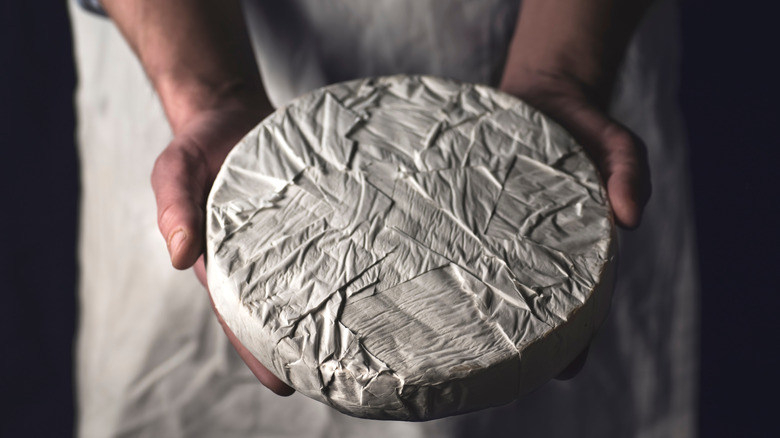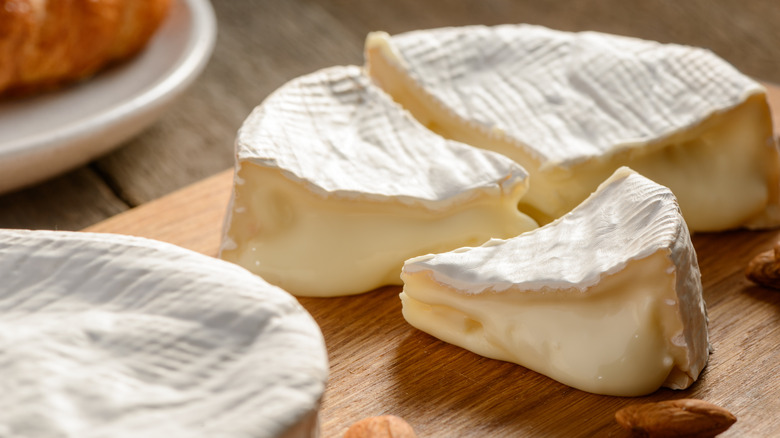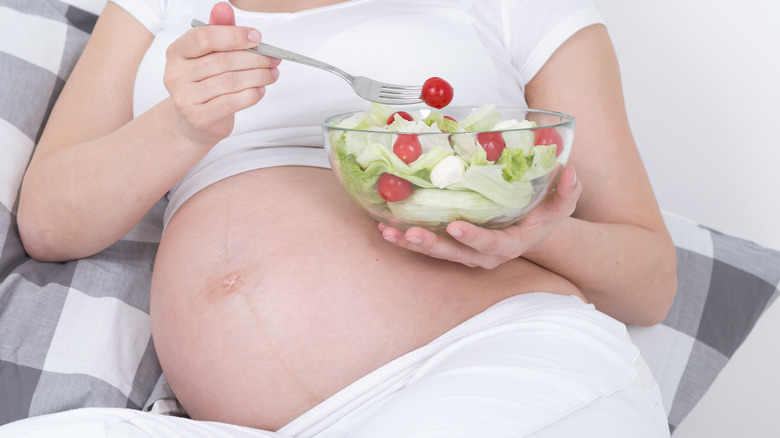The Reason You Won't Find Authentic Brie In The US
If you've ever eaten cheese, you've probably tried Brie. The delicate, creamy cheese with the crusty, edible white rind is one of the most popular cheeses worldwide. In fact, it's a feature of most fancy cheese platters. But have you ever eaten real French brie? What you perhaps didn't know about brie is that the American version is actually different.
Authentic French brie is made with raw cow's milk — unpasteurized — and then aged. It has a white, "bloomy rind" that is edible but not nearly as tasty as the creamy interior of brie (via Food52). It's best served at room temperature, close to its best before date, cut into thin wedges, and enjoyed with a chilled glass of white wine. Think buttery Chardonnay or crisp Pinot Grigio here.
According to IDFA, the International Dairy Foods Association, Americans each consume roughly 40 pounds of cheese per year, but few have ever tried authentic French brie. How come? It's ultimately because of its raw, unpasteurized milk.
Bacteria is typically what causes milk to spoil, and the raw milk used by the French is not pasteurized, which is the process that kills that harmful bacteria. While pasteurization kills most pathogenic bacteria, some dairy products, such as soft cheeses, are made with unpasteurized milk in order to achieve unique flavors by preserving natural microflora found in unpasteurized milk. Studies of different raw cow's milk from around the world found in samples small percentages of bacteria such as e. Coli, salmonella, and listeria.
Here's why you'd actually eat bacteria-ridden cheese
Bacteria is essential for the flavor and development of cheeses. After all, not all bacteria are bad! However, the FDA has strict criteria on what can be imported from overseas, which means some cheeses are illegal in the USA (via J.S. Bailey). These include not only brie but also some blue cheeses and camembert that are made with raw milk products in France.
Many cheesemakers argue that the FDA is being overly cautious with its criteria for imports. The process that kills the bacteria also kills off some of the flavor profiles, especially some of the more subtle ones. The means the flavors and textures of French and American brie can be very different. "Every organism could potentially have different contributions to the flavor," says Rachel Dutton, a Harvard scientist who studies microbial ecosystems of cheese (via NPR).
In the U.S., it is common for cheese production facilities to go through rigorous sanitation procedures and remove all microbial agents in order to ensure food safety. In France, however, cheese makers attempt to maintain a healthy balance of microorganisms that "outgrow" bad bacteria before they can cause illness. Maintaining that traditional brie flavor is important to the French, and so they're studying how cheese may become safer by "protecting the biodiversity of raw milk microbes," per NPR.
Doctors recommend not eating soft cheeses during pregnancy
Despite all the new research being done on good bacteria in cheeses and safer raw milk cheese, there isn't enough known in order to make it safe for pregnant women. So it's best just to avoid those cheese products for those nine months.
The bacteria pregnant women are avoiding is listeria. According to Dr. Neely Elisha, who spoke with Romper, listeria infection can cause severe issues with the fetus. It can take up to two months for the infection to take effect. The mother may experience no symptoms or flu-like symptoms, but the fetus may become affected, leading to the baby being born with meningitis or sepsis, among worse complications.
Therefore, while many cheesemakers consider the bacteria in soft cheeses to be safe, it's best to always be cautious while pregnant. And if you're a cheese lover and can't bear to stay away from them for that long, stick to hard cheeses made with pasteurized milk products. You can also always rely on good ole American cheese to get you through!


